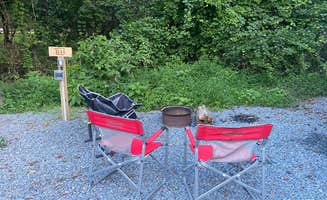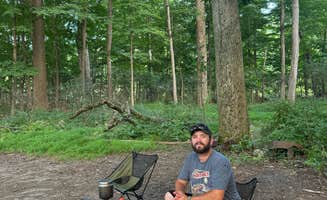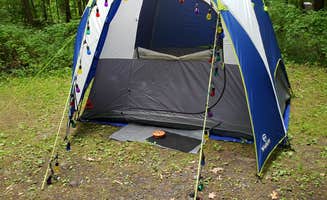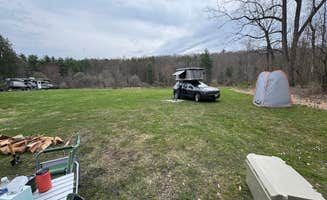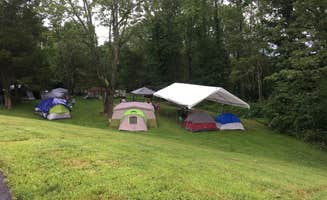Camping spots near Montague, New Jersey lie within the Delaware River Valley, where elevations range from 350 to 1,800 feet above sea level. The region experiences moderate rainfall throughout summer camping season, with average daytime temperatures reaching 80-85°F in July and August. Winter camping options remain available at select locations where temperatures typically drop to 20-30°F during December through February.
What to do
Waterfall hiking: 5 minutes from campsites. Near Dingmans Campground, several stunning waterfalls await exploration. "Waterfall in pic was a 5 min drive from the campground and then a 40 min hike. Worth it!" according to Rob M. These accessible natural features provide excellent photography opportunities and cooling recreation during summer months.
Kayaking from island campsites: Namanock Island offers unique paddle-in camping accessible only by water. "Did a solo trip, paid $20 for day and overnight parking at Milford beach. Paddle about 4 miles to the site," shares Sean M. The island's primitive sites require all supplies be packed in but reward campers with exceptional solitude.
Wildlife watching along river campsites: Birdwatching opportunities abound along the Delaware River corridor, particularly for spotting bald eagles. "Saw tons of bald eagles flying near the site and while paddles birds playing and baby geese with their mommas!" notes one Namanock Island visitor. Morning and evening hours provide best viewing times from riverside camps.
What campers like
Spacious wooded sites: Stokes State Forest earns praise for its generously sized camping areas. "Campsite was very spacious and had a platform where we were able to fit two tents. There was plenty of space on the site for more tents," writes E.M.V. The forest's mature tree canopy provides ample shade during summer months.
Clean shower facilities: Several campgrounds maintain exceptional bathroom amenities. At Dingmans Campground, visitors note "The bathrooms/showers are the cleanest we've ever seen at any campground. They are newly built or refurbished and spotless." These facilities typically include hot water, though availability may vary by season.
River swimming access: Direct water access ranks highly among camper priorities. "The river is beautiful and was so nice to jump into! Some people even made little pools made of rocks!" reports Jackie about her experience at Dingmans Campground. Swimming areas vary from shallow wading spots to deeper swimming holes depending on seasonal water levels.
What you should know
Site privacy varies significantly: Campgrounds in the Montague area range from secluded to social settings. At High Point State Park Campground, "The site was maybe a 50-yard walk-in and we barely heard anyone around us and had a real wilderness feel," according to Justin P. Research individual site maps before booking to secure desired privacy level.
Reservation timing matters: Most campgrounds fill quickly during peak summer weekends. "We stayed on a Friday night. While making reservations it said almost all sites were full but upon arrival the vast majority of sites were empty which made for a quiet/relaxing night," notes Josh S. about Stokes State Forest. Consider mid-week stays for greater availability.
Road noise affects some sites: Highway proximity impacts certain campgrounds. "Located just off the highway so lots of vehicle noise 24/7. Sites are on a gravel lot," reports Michael H. about one location. Research campground locations relative to major roadways before booking if seeking quieter environments.
Bear precautions required: The region hosts black bears requiring proper food storage. "Remember, this is bear country so proper food storage is a must. Bear lockers are not provided," cautions one Stokes State Forest visitor. Campers should bring bear-resistant containers or prepare to hang food supplies.
Tips for camping with families
Kid-friendly programming: Pickerel Point Campground offers organized activities for younger campers. "Was pleasantly surprised they have programs for kids. Can never go wrong here," states John R. These programs typically run on weekends during summer months and may include nature walks and craft activities.
Easy biking paths: Paved campground roads provide safe cycling areas for children. "Love that the road is paved, it makes it easy for the kids to ride bikes, skate etc," shares Paula R. about Pickerel Point. Bring helmets and consider timing rides during lower traffic morning hours.
Ranger interactions: Park staff frequently engage with younger visitors at certain locations. "The park ranger person came through and gave the kids cool posters, and just made it a very fun place for all the kids," reports Jill R. about her experience at Kittatinny Campground. These educational interactions typically occur during daytime hours.
Tips from RVers
Electric hookup limitations: Shotwell Campground in Stokes State Forest accommodates smaller campers without electrical connections. "My wife and I have a 15' Jayco and this place is our go to," notes Travis S. Most campgrounds in the region limit RV length to under 35 feet with limited or no hookups.
Winter camping considerations: Some campgrounds remain open year-round with reduced services. "Sites have electric but no water. Spigot close by. Heated cozy bathhouse with clean showers," explains Mara S. about winter camping at Pickerel Point. Winter campers should prepare for potentially challenging access roads during snow events.
Site leveling challenges: Many campgrounds feature uneven terrain requiring leveling equipment. "If you are not comfortable with lots of tight turns I would not recommend for you!" cautions Jackie regarding RV navigation at Dingmans Campground. Consider bringing extra leveling blocks when camping in the more mountainous portions of the region.




